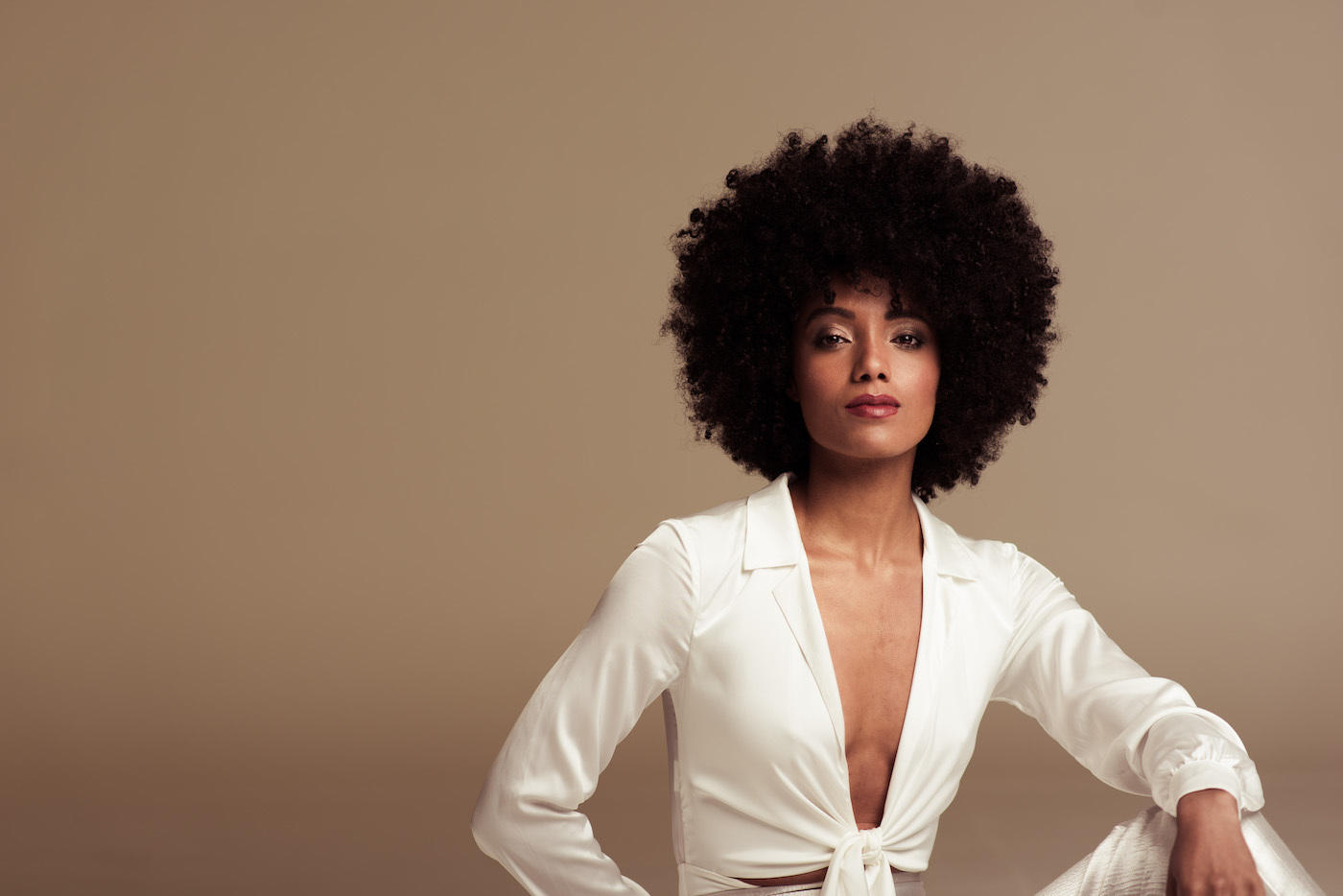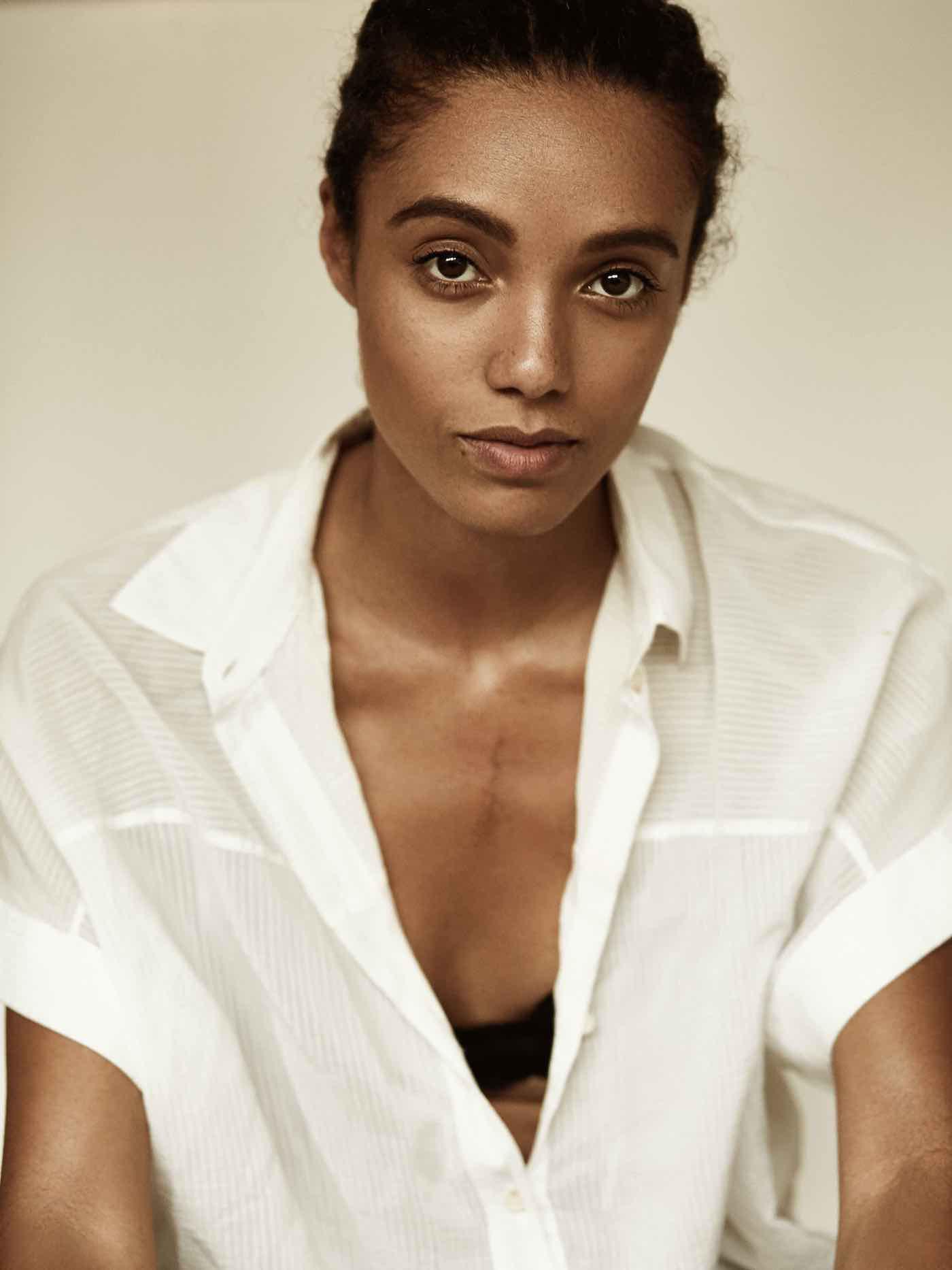
Maisie Richardson-Sellers is leading the charge for the representation of young queer women of color. After landing her first role in Star Wars: The Force Awakens in 2015, she was cast as Rebekah Mikaelson in hit fantasy drama, The Originals. It was in 2016 that she played her breakout television role of Vixen in the CW series, Legends of Tomorrow. Most recently, she portrayed Chloe Winthrop in Netflix’s hit rom-com, The Kissing Booth 2. Apart from acting, Maisie co-founded Shethority, a digital platform for female empowerment, in 2017, and her own production company, Barefaced Productions, in 2020. This August, Kristin Prim spoke to Maisie about queer representation, taking pool lessons for Kissing Booth 2, and accepting your truest self.
KP: One of the first things that I initially discovered about you is that you graduated from Oxford with a degree in Archaeology and Anthropology. That is so amazing and incredibly interesting. What made you want to pursue that as a major?
MRS: I have always been fascinated by the diversity of cultures and I absolutely adored my degree. Every week we would be exploring a different tribe, civilization, or phase of evolution spanning from the dawn of homo sapiens up to the present day. I think that social anthropology should be a compulsory subject in schools. It decolonizes perspectives, deconstructs prejudice, and shows you that all aspects of our cultural life, from religion to gender to kinship, are merely one of a multitude of interpretations that have ebbed and flowed throughout history.
KP: You identify as queer and have been very vocal about queer representation in the media, and particularly the visibility of queer women of color. As a queer woman myself, I always have tried to be the representation that I felt I needed when I was growing up, especially when there was such a lack of kind yet tough, independent femme individuals in the public eye. I always find myself asking the same of anyone around my age. That said, how important is it for you to be the representation that you may have lacked?
MRS: Growing up I so rarely saw myself represented in the media, or even in books, and that definitely contributed to my feelings of shame when I was exploring my sexuality. The pleasure and power that can come from seeing yourself reflected back to you is immeasurable. It tells you that your story matters, that you should be proud of who you are. It also exposes those who don’t encounter diversity on a daily basis to those who are different from them. As we call for increased diverse representation on screen, it is imperative that we also push for that same diversity amongst our writers, directors, and crews. Only then do we see complex, nuanced, and diverse stories written from lived experience.
 Photo by Lucia O’Connor-McCarthy
Photo by Lucia O’Connor-McCarthy “Growing up I so rarely saw myself represented in the media, or even in books, and that definitely contributed to my feelings of shame when I was exploring my sexuality. The pleasure and power that can come from seeing yourself reflected back to you is immeasurable. It tells you that your story matters, that you should be proud of who you are.”
KP: What advice would you lend to women who may be struggling to accept their own sexual identities?
MRS: At times sexual identity can be confusing, overwhelming, frustrating, and isolating… I’ve been there. But just know that you are a part of a phenomenal, strong, vivacious global family who are waiting to welcome you with open arms. Everywhere that I travel, I try and tap into the local LGBTQAI+ community, and it has led to some of my favourite moments and friendships. If you haven’t found your community yet, or a space where you are truly accepted for who you are, know that that space IS out there, and it is only a matter of time until you do. So hold your head up high. Be gentle with yourself. You should be incredibly proud to take ownership of your truth and if you’re not right now, that’s okay. Your time is coming.
KP: You co-founded SheThority in 2017, which identifies itself as a “positive place for women and the feminine to inspire, empower, and share.” I started in publishing when I was 14 years old, and to me, there is no greater power in the world than the press. It has been my goal for the past twelve years to get women more involved in publishing, as well as the telling of their own stories. What made you want to establish SheThority?
MRS: Whilst filming in Vancouver, a group of us female actors from across the DC comic book TV shows regularly met to discuss our experiences, fears, and triumphs. We benefited from it so much that we decided that we wanted to open up these conversations to whoever wanted to be a part of them. Thus, Shethority was born! We are a supportive, inclusive community that exists to uplift each other and to find solace and strength in our shared experiences. We centered our website around articles written by our community members on whatever topics they want, and the turnout has been phenomenal!
KP: What has been your most memorable role thus far in your career? What do you still wish to accomplish? Is there anyone in particular, specifically or in general, that you would love to represent?
MRS: For me, the joy of acting is being able to inhabit as many contrasting characters as possible. So whenever I am presented with an opportunity to embody someone completely out of my comfort zone, that is when I am happiest! As a result, I honestly don’t have a most memorable role. Each has taught me and challenged me in unique ways. I have yet to play a queer character, and I would absolutely love to! It would mean a huge amount to be able to represent my own identity.
“The film and TV industries are still shockingly homogenous, even as we begin to see increasing diversity in front of the camera. Barefaced Productions was birthed from the desire to reclaim our stories, and to provide a platform for marginalized creatives who are so often ignored by the mainstream.”
KP: You established your own production company, Barefaced Productions, which is focused on bringing the stories of marginalized voices to the forefront. What led you to establish such a firm?
MRS: So often in film and television, those who are not cis, white and heterosexual have had their stories told for them, if they are even told at all. The film and TV industries are still shockingly homogenous, even as we begin to see increasing diversity in front of the camera. Barefaced Productions was birthed from the desire to reclaim our stories, and to provide a platform for marginalized creatives who are so often ignored by the mainstream. There is such an incredible wealth of beauty, power, tragedy and joy in our experiences, and Barefaced Productions seeks to bring these stories to life, with inclusive diversity at every stage of the creative process.
KP: You recently co-wrote and directed your first short film, Sunday’s Child. What can you tell us about it?
MRS: Sunday’s Child follows a young WOC photographer who is struggling with her sexuality and isolation. We follow her over the course of one day as she stumbles upon a vibrant community of QTPOC artists – by being accepted for being just as she is for the first time, she is able to start down the road to self-acceptance and self-love.
KP: I read that to film Kissing Booth 2, you trained with a champion pool player three times a week. I, too, love pool, and some of my greatest memories from my late teens and early 20s were spent in dive bars way too late at night shooting pool until the night became the morning. What was the greatest part of this experience? Are there any tips that you can share?
MRS: It was amazing! I also have spent many a night around a grungy pool table (and a fair few times pretending that I knew what I was doing to impress a girl). So, to finally be able to learn from a world champion was a dream come true! In the third film, you get to see more of Chloe’s expertise, and I was very chuffed to not have to use a double for any of the shots in the film. A couple of tips would be:
● Find the rhythm in your breath and sync it to the movement of your arm as you shoot; tension is your worst enemy.
● It’s all about geometry – set up your shots.
● Like myself and the majority of people, you are most likely not holding the cue or standing correctly, so google the correct position – it makes a world of difference!
KP: What is some advice that you can impart upon women who may want to get involved in the entertainment industry? Is there anything that you regret or would have done differently?
MRS: Your voice, presence, and perspective would be a crucial asset to this industry. Finding others who are looking to do the same as you or who are already doing it really helps. My journey into directing and producing became so much easier once I found communities of like-minded individuals. It enabled me to enjoy the process more and to turn to others for support or advice when needed. It’s not an easy ride and you will need to thicken your skin, but the reward is worth it. I don’t regret anything about my journey thus far, as I am a firm believer in “everything in its right time.” Sometimes the reasoning might not be clear right away, but up ahead a new path to a new adventure just opened up.
Photography by Pip (cover image)